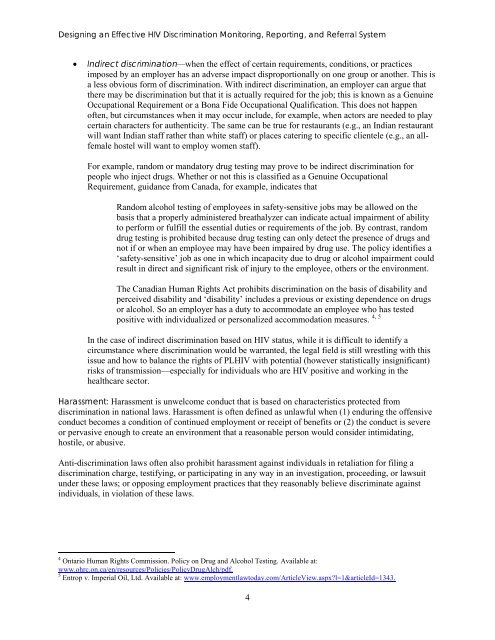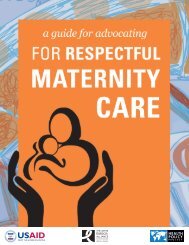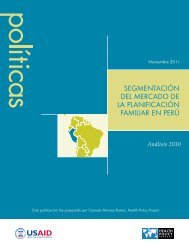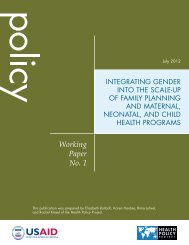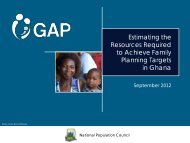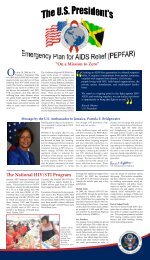English Version - Health Policy Project
English Version - Health Policy Project
English Version - Health Policy Project
You also want an ePaper? Increase the reach of your titles
YUMPU automatically turns print PDFs into web optimized ePapers that Google loves.
Designing an Effective HIV Discrimination Monitoring, Reporting, and Referral System<br />
• Indirect discrimination—when the effect of certain requirements, conditions, or practices<br />
imposed by an employer has an adverse impact disproportionally on one group or another. This is<br />
a less obvious form of discrimination. With indirect discrimination, an employer can argue that<br />
there may be discrimination but that it is actually required for the job; this is known as a Genuine<br />
Occupational Requirement or a Bona Fide Occupational Qualification. This does not happen<br />
often, but circumstances when it may occur include, for example, when actors are needed to play<br />
certain characters for authenticity. The same can be true for restaurants (e.g., an Indian restaurant<br />
will want Indian staff rather than white staff) or places catering to specific clientele (e.g., an allfemale<br />
hostel will want to employ women staff).<br />
For example, random or mandatory drug testing may prove to be indirect discrimination for<br />
people who inject drugs. Whether or not this is classified as a Genuine Occupational<br />
Requirement, guidance from Canada, for example, indicates that<br />
Random alcohol testing of employees in safety-sensitive jobs may be allowed on the<br />
basis that a properly administered breathalyzer can indicate actual impairment of ability<br />
to perform or fulfill the essential duties or requirements of the job. By contrast, random<br />
drug testing is prohibited because drug testing can only detect the presence of drugs and<br />
not if or when an employee may have been impaired by drug use. The policy identifies a<br />
‘safety-sensitive’ job as one in which incapacity due to drug or alcohol impairment could<br />
result in direct and significant risk of injury to the employee, others or the environment.<br />
The Canadian Human Rights Act prohibits discrimination on the basis of disability and<br />
perceived disability and ‘disability’ includes a previous or existing dependence on drugs<br />
or alcohol. So an employer has a duty to accommodate an employee who has tested<br />
positive with individualized or personalized accommodation measures. 4, 5<br />
In the case of indirect discrimination based on HIV status, while it is difficult to identify a<br />
circumstance where discrimination would be warranted, the legal field is still wrestling with this<br />
issue and how to balance the rights of PLHIV with potential (however statistically insignificant)<br />
risks of transmission—especially for individuals who are HIV positive and working in the<br />
healthcare sector.<br />
Harassment: Harassment is unwelcome conduct that is based on characteristics protected from<br />
discrimination in national laws. Harassment is often defined as unlawful when (1) enduring the offensive<br />
conduct becomes a condition of continued employment or receipt of benefits or (2) the conduct is severe<br />
or pervasive enough to create an environment that a reasonable person would consider intimidating,<br />
hostile, or abusive.<br />
Anti-discrimination laws often also prohibit harassment against individuals in retaliation for filing a<br />
discrimination charge, testifying, or participating in any way in an investigation, proceeding, or lawsuit<br />
under these laws; or opposing employment practices that they reasonably believe discriminate against<br />
individuals, in violation of these laws.<br />
4 Ontario Human Rights Commission. <strong>Policy</strong> on Drug and Alcohol Testing. Available at:<br />
www.ohrc.on.ca/en/resources/Policies/<strong>Policy</strong>DrugAlch/pdf.<br />
5 Entrop v. Imperial Oil, Ltd. Available at: www.employmentlawtoday.com/ArticleView.aspxl=1&articleId=1343.<br />
4


